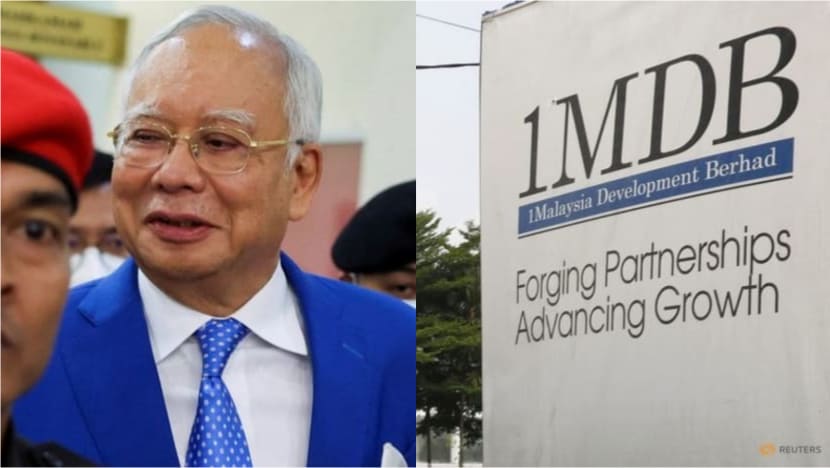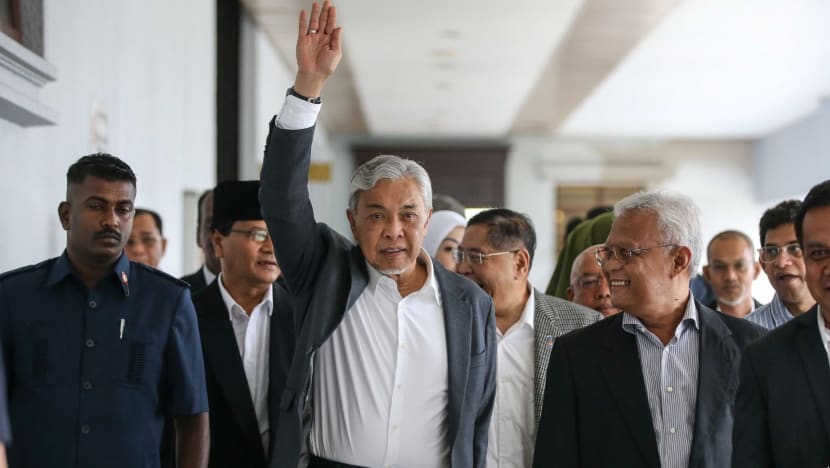Commentary: Najib's partial pardon will affect trust in Malaysia's institutions, some more than others
As Prime Minister Anwar Ibrahim’s government gains momentum in tackling corruption, former PM Najib Razak’s reduced 1MDB sentence - and potential pursuit of a full pardon - will have implications, says ISEAS-Yusof Ishak Institute’s James Chai.

Former Malaysian prime minister Najib Razak had his jail sentence for corruption reduced from 12 to six years. (Photos: Reuters/Hasnoor Hussain; Olivia Harris)

This audio is generated by an AI tool.
KUALA LUMPUR: For better or for worse, public trust in institutions are shaped not by everyday events but the major, though infrequent, events. Former Malaysia prime minister Najib Razak's partial pardon announced in February is one such hallmark event that could redefine how Malaysians perceive the institutions that run the country.
In the past, Malaysians broadly believed that institutions were heavily politicised by the government of the day. However, in recent years, there has been a gradual decoupling of institutions and politics.
Najib was convicted for corruption in the multi-billion 1MDB scandal that shook the country and the financial world and began serving his 12-year jail term in August 2022. The partial pardon halved his sentence and significantly reduced the fines imposed on him.
Not everyone was thrilled by this development related to the biggest corruption scandal in Malaysia’s history. Najib diehard supporters saw a partial pardon as insufficient; others saw a potential backsliding on the government’s commitment to tackle graft.
But how might this affect how Malaysians look at the Pardons Board, the courts and the Attorney General’s Chambers as institutions?
PARDONS BOARD: BLURRING LINES BETWEEN JUSTICE AND MERCY
The most obvious implication is how Malaysians look at the Pardons Board. Amid the outrage, many had called for more accountability in the board’s decisions, including releasing its reasoning and justifications. None had been provided in Najib’s partial pardon.
Other legal experts have also pointed to the conflict of interest in the attorney-general (AG)’s role in the Pardons Board. It puts the AG in an awkward position to advise the Pardons Board on mercy for someone his institution has pursued for conviction.
At the same time, Najib’s partial pardon may now also encourage politicians embroiled in legal cases to push for the Pardons Board to consider their cases after exhausting the criminal appeals process at the courts.
Both may lead to a blurring of lines between justice and mercy. Pushing for more accountability of Pardons Board decisions may push burdens of justice to an institution of mercy. Treating pardon as a norm rather than an exception dilutes the purpose of the Pardons Board and the courts.
However, any push for more transparency will likely still be limited and contained because of deference for the king - who heads the Pardons Board - and his reserved discretion.
COURTS: EARNED CREDIBILITY NOT EASILY DESTROYED
No matter the decision of the Pardons Board, the courts’ credibility is not likely to be affected. The majority of Malaysians, who believed that the Federal Court decision to send Najib to prison was correct after a comprehensive appeals process, would likely still believe in the court’s wisdom to dispense judgments in future cases.
Under Chief Justice Tengku Maimun Tuan Mat’s leadership, perception of the judicial system has recovered from its inglorious 1988 constitutional crisis and 2007 Lingam tape scandal about alleged fixing of judicial promotions, which cast doubt on judges’ credibility.
High-profile cases like the sentencing of Najib - the first former prime minister in Malaysia to be jailed - has substantially changed public opinion for the better. It showed that the court was unafraid to mete out judgments - even criminal ones - against high-profile politicians, even those from the ruling party.
Neither do politicians’ court cases all end up with the same predictable outcomes. It lends credence to the notion that their cases were decided on individual merits instead of extraneous factors.
In March 2023, the courts found Najib not guilty of 1MDB-related audit tampering. The courts similarly acquitted United Malay National Organisation (UMNO) party president Ahmad Zahid Hamidi in the foreign visa system bribery case and UMNO secretary-general Ahmad Maslan of money laundering charges.
The courts’ credibility has been earned through the past few years. It will likely be unaffected by Najib’s partial pardon, but there may be concerns of whether the final appeals courts’ will be truly final when it involves politicians.

ATTORNEY GENERAL’S CHAMBERS: NEEDS MORE CONVINCING
However, the AGC’s perceived independence on corruption cases will continue to be challenging, even without Najib’s partial pardon.
Not least because the attorney-general is a position appointed by the prime minister of the day, and the series of discharges not amounting to acquittal involving high-profile politicians will always invite criticism, regardless of its merits.
It is the absolute discretion for the AG to initiate, continue or discontinue the prosecution of a case. If the AGC decides to drop charges - as prosecutors did with Mr Ahmad Zahid in September 2023 in a separate charity foundation graft case - the courts have no power to insist otherwise. No reason by the AGC is needed.
Even though the new AG Ahmad Terrirudin Mohd Salleh was only appointed less than a year ago, he carries the burden of prosecuting corruption cases without fear or favour - like that of former finance minister Daim Zainuddin, who was charged in February for failing to disclose assets, as part of a probe into those named in the leaked Pandora Papers.
This may be more challenging than it appears. Political cases will always be seen as biased, even if pursued purely on its merits without political interference. UMNO politicians charged a few years ago cried political witch-hunt by the then prime minister Mahathir Mohamad; the same has happened now with probes into Dr Mahathir’s close associates and children.
Najib’s pardon likely would not affect the perception of the AGC. Efforts by Prime Minister Anwar Ibrahim to split the AG's dual role of chief legal adviser and lead criminal prosecutor will matter more. Only with this would the public be confident that prosecutions are made in the interest of justice and society, even against senior officials, and not beholden to the government of the day.
NAJIB RAZAK’S PURSUIT FOR FULL PARDON?
Even though Najib’s partial pardon unlikely had the effect of uniformly diminishing public trust in Malaysia’s institutions and its corruption drive, they might once again be put to the test.
His lawyer said, shortly after his partial pardon was announced, that Najib was considering filing a new pardon request. The jailed former prime minister has consistently denied wrongdoing.
If Najib succeeds, public trust would undoubtedly plummet to a new low. But if he does not, public trust would ironically improve – though more for some than others.
James Chai is a Visiting Fellow of ISEAS-Yusof Ishak Institute and the author of Sang Kancil (Penguin Random House).



















